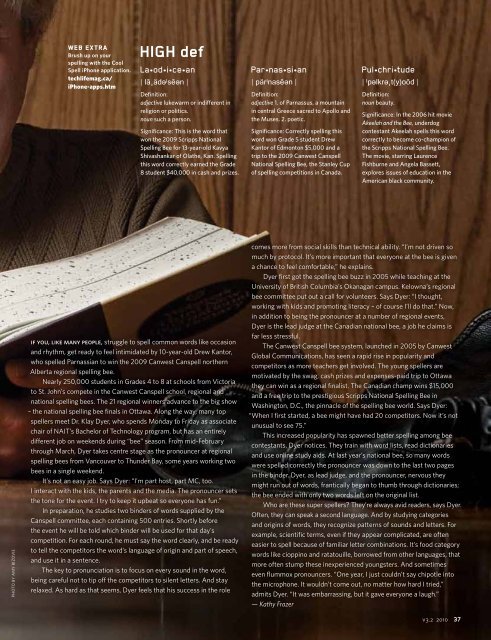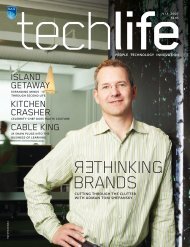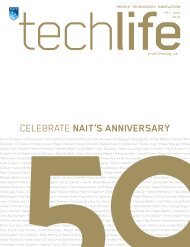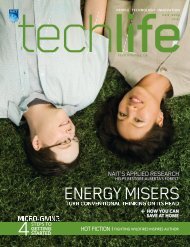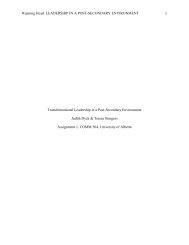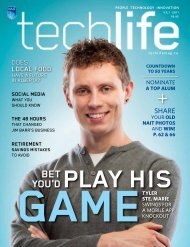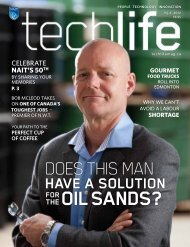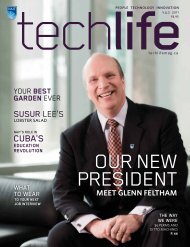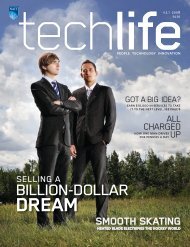Read the full print edition - techlife magazine
Read the full print edition - techlife magazine
Read the full print edition - techlife magazine
You also want an ePaper? Increase the reach of your titles
YUMPU automatically turns print PDFs into web optimized ePapers that Google loves.
PHOTO BY AMY BIZOVIE<br />
Web Extra<br />
brush up on your<br />
spelling with <strong>the</strong> cool<br />
spell iphone application.<br />
<strong>techlife</strong>mag.ca/<br />
iPhone-apps.htm<br />
high def<br />
La•od•i•ce•an<br />
| lā�ädǝˡsēǝn |<br />
definition:<br />
adjective lukewarm or indifferent in<br />
religion or politics.<br />
noun such a person.<br />
significance: this is <strong>the</strong> word that<br />
won <strong>the</strong> 2009 scripps national<br />
spelling Bee for 13-year-old Kavya<br />
shivashankar of ola<strong>the</strong>, Kan. spelling<br />
this word correctly earned <strong>the</strong> Grade<br />
8 student $40,000 in cash and prizes.<br />
if you, like many people, struggle to spell common words like occasion<br />
and rhythm, get ready to feel intimidated by 10-year-old Drew Kantor,<br />
who spelled Parnassian to win <strong>the</strong> 2009 Canwest Canspell nor<strong>the</strong>rn<br />
Alberta regional spelling bee.<br />
Nearly 250,000 students in Grades 4 to 8 at schools from Victoria<br />
to St. John’s compete in <strong>the</strong> Canwest Canspell school, regional and<br />
national spelling bees. The 21 regional winners advance to <strong>the</strong> big show<br />
– <strong>the</strong> national spelling bee finals in Ottawa. Along <strong>the</strong> way, many top<br />
spellers meet Dr. Klay Dyer, who spends Monday to Friday as associate<br />
chair of NAIT’s Bachelor of Technology program, but has an entirely<br />
different job on weekends during “bee” season. From mid-February<br />
through March, Dyer takes centre stage as <strong>the</strong> pronouncer at regional<br />
spelling bees from Vancouver to Thunder Bay, some years working two<br />
bees in a single weekend.<br />
It’s not an easy job. Says Dyer: “I’m part host, part MC, too.<br />
I interact with <strong>the</strong> kids, <strong>the</strong> parents and <strong>the</strong> media. The pronouncer sets<br />
<strong>the</strong> tone for <strong>the</strong> event. I try to keep it upbeat so everyone has fun.”<br />
In preparation, he studies two binders of words supplied by <strong>the</strong><br />
Canspell committee, each containing 500 entries. Shortly before<br />
<strong>the</strong> event he will be told which binder will be used for that day’s<br />
competition. For each round, he must say <strong>the</strong> word clearly, and be ready<br />
to tell <strong>the</strong> competitors <strong>the</strong> word’s language of origin and part of speech,<br />
and use it in a sentence.<br />
The key to pronunciation is to focus on every sound in <strong>the</strong> word,<br />
being careful not to tip off <strong>the</strong> competitors to silent letters. And stay<br />
relaxed. As hard as that seems, Dyer feels that his success in <strong>the</strong> role<br />
Par•nas•si•an<br />
| pärˡnasēǝn |<br />
definition:<br />
adjective 1. of parnassus, a mountain<br />
in central Greece sacred to Apollo and<br />
<strong>the</strong> muses. 2. poetic.<br />
significance: Correctly spelling this<br />
word won Grade 5 student drew<br />
Kantor of edmonton $5,000 and a<br />
trip to <strong>the</strong> 2009 Canwest Canspell<br />
national spelling Bee, <strong>the</strong> stanley Cup<br />
of spelling competitions in Canada.<br />
Pul•chri•tude<br />
| ˡpǝlkrǝ�t(y)oōd |<br />
definition:<br />
noun beauty.<br />
significance: in <strong>the</strong> 2006 hit movie<br />
Akeelah and <strong>the</strong> Bee, underdog<br />
contestant Akeelah spells this word<br />
correctly to become co-champion of<br />
<strong>the</strong> scripps national spelling Bee.<br />
<strong>the</strong> movie, starring Laurence<br />
fishburne and Angela Bassett,<br />
explores issues of education in <strong>the</strong><br />
American black community.<br />
comes more from social skills than technical ability. “I’m not driven so<br />
much by protocol. It’s more important that everyone at <strong>the</strong> bee is given<br />
a chance to feel comfortable,” he explains.<br />
Dyer first got <strong>the</strong> spelling bee buzz in 2005 while teaching at <strong>the</strong><br />
University of British Columbia’s Okanagan campus. Kelowna’s regional<br />
bee committee put out a call for volunteers. Says Dyer: “I thought,<br />
working with kids and promoting literacy – of course I’ll do that.” Now,<br />
in addition to being <strong>the</strong> pronouncer at a number of regional events,<br />
Dyer is <strong>the</strong> lead judge at <strong>the</strong> Canadian national bee, a job he claims is<br />
far less stressful.<br />
The Canwest Canspell bee system, launched in 2005 by Canwest<br />
Global Communications, has seen a rapid rise in popularity and<br />
competitors as more teachers get involved. The young spellers are<br />
motivated by <strong>the</strong> swag, cash prizes and expenses-paid trip to Ottawa<br />
<strong>the</strong>y can win as a regional finalist. The Canadian champ wins $15,000<br />
and a free trip to <strong>the</strong> prestigious Scripps National Spelling Bee in<br />
Washington, D.C., <strong>the</strong> pinnacle of <strong>the</strong> spelling bee world. Says Dyer:<br />
“When I first started, a bee might have had 20 competitors. Now it’s not<br />
unusual to see 75.”<br />
This increased popularity has spawned better spelling among bee<br />
contestants, Dyer notices. They train with word lists, read dictionaries<br />
and use online study aids. At last year’s national bee, so many words<br />
were spelled correctly <strong>the</strong> pronouncer was down to <strong>the</strong> last two pages<br />
in <strong>the</strong> binder. Dyer, as lead judge, and <strong>the</strong> pronouncer, nervous <strong>the</strong>y<br />
might run out of words, frantically began to thumb through dictionaries;<br />
<strong>the</strong> bee ended with only two words left on <strong>the</strong> original list.<br />
Who are <strong>the</strong>se super spellers? They’re always avid readers, says Dyer.<br />
Often, <strong>the</strong>y can speak a second language. And by studying categories<br />
and origins of words, <strong>the</strong>y recognize patterns of sounds and letters. For<br />
example, scientific terms, even if <strong>the</strong>y appear complicated, are often<br />
easier to spell because of familiar letter combinations. It’s food category<br />
words like cioppino and ratatouille, borrowed from o<strong>the</strong>r languages, that<br />
more often stump <strong>the</strong>se inexperienced youngsters. And sometimes<br />
even flummox pronouncers. “One year, I just couldn’t say chipotle into<br />
<strong>the</strong> microphone. It wouldn’t come out, no matter how hard I tried,”<br />
admits Dyer. “It was embarrassing, but it gave everyone a laugh.”<br />
— Kathy Frazer<br />
v3.2 2010 37


